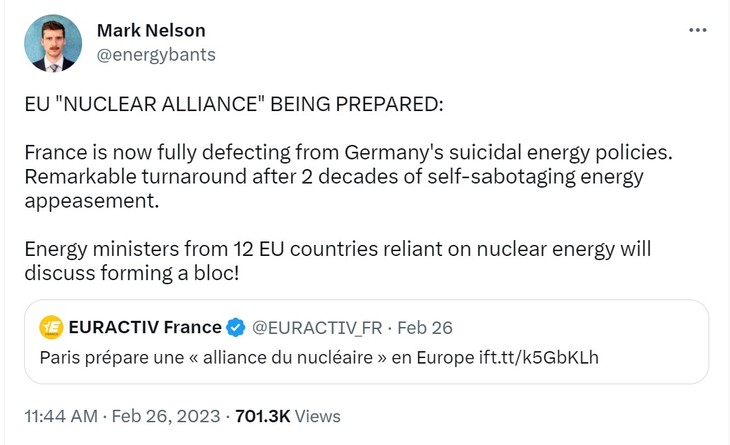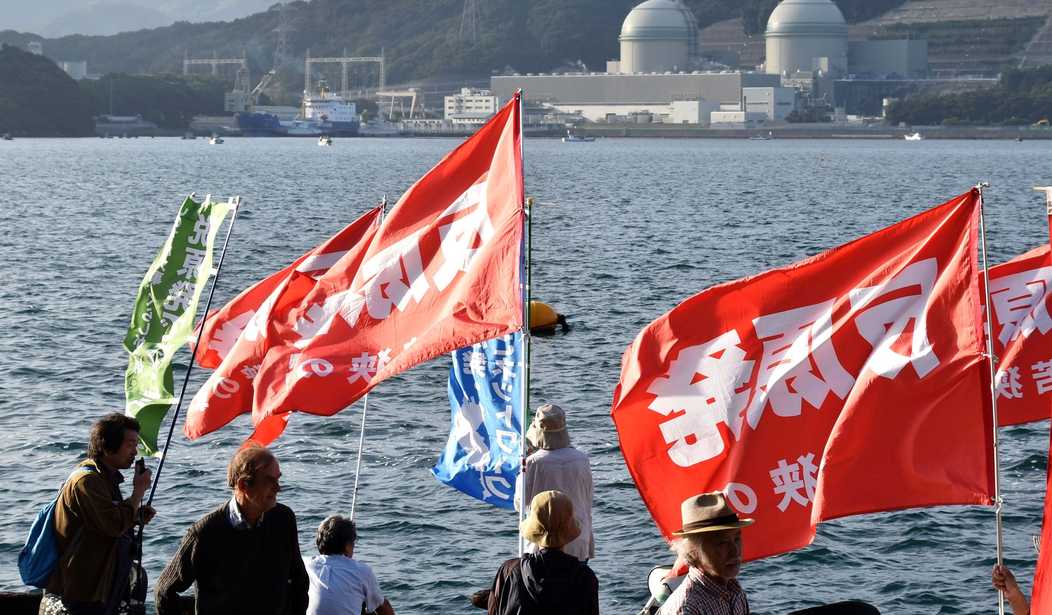What a day in the news for nuclear power. I’m pretty sure it won’t be getting the red-headed-step-child treatment for much longer.
France is leading the charge on this one and, ho boy. Hard core Green heads have to be ‘sploding.
Eleven EU member states vowed on Tuesday to “strengthen cooperation” on nuclear energy, which they said would help Europe move away from carbon-emitting fossil fuels.
Bulgaria, Croatia, Czech Republic, Finland, France, Hungary, Netherlands, Poland, Romania, Slovakia and Slovenia agreed “to support new projects” alongside existing nuclear plants, according to a statement released during a meeting of EU energy ministers in Stockholm.
“Nuclear energy is one of many tools for achieving our climate targets”, to produce electricity to meet consumer demand and “for security of supply”, they said.
Ministers from the 11 countries also considered the opportunities for further scientific cooperation on nuclear energy and to share best practices to address safety issues.
If you look at the list of countries, though, it’s not a surprise at all – who are they? For the most part, they are smaller, less economically powerful EU states who have taken it in the chops thanks to the fanatic adherence to renewables of major players like Germany. Often, too, many of them were importers of both fuel and electricity from closer Russian or Ukrainian sources prior to the conflict. No doubt they do not want to continue in such positions of vulnerability any longer.
As far as those big Brussels players go, they’re sniffing in disdain at the pretensions of the small bloc. Completely ignoring the fact that their own energy resources are a shambles, it sounds like they’ll take comfort in their black-out prone, renewable superiority.
…Austria, Germany and Luxembourg reaffirmed their opposition in Stockholm to the development of nuclear energy in Europe.
“If we want to win the race against climate change, we need to be fast,” Luxembourg Energy Minister Claude Turmes said on Monday, adding that new nuclear stations would take 15 years to build.
“It’s much more about ideology than being practical,” he added.
Oh, gosh – where’ve we heard “it’ll take 15 years to build so don’t even bother” before? Something about drilling for oil and energy independence, I think it was.
Well, my goodness! Even as I’m writing, Italy has joined the pact! That is a great move for Meloni’s government, but that girl is on her game when it comes to Italy’s safeguarding energy resources.

Correction: it's a lucky 13, including France!
And probably only a few national elections away from putting the other nuclear-operating EU countries into this bloc as well.
For more on France's intentional self-sabotage at the behest of Germany:https://t.co/Q0G0xXxmaZ
— Mark Nelson (@energybants) February 26, 2023
It’s going to be very lonely and cold for the hold-outs. And very interesting watching what sort of spikes they attempt to put in the wheels of this deal going forward.
Another country having its moment of reckoning/reality check is Japan. For the first time since the Fukushima disaster, the opinion in the country has swung to a majority positive for nuclear. No doubt that consensus has been helped along by coping with their very own energy crisis.
🗣️ "Given the current economic downturn, rising prices and surge in fuel costs, I wonder if there’s any choice but to use nuclear power in order to survive," said Hirayama, a hotel owner in a town near Fukushima Dai-ichi
Hirayama had his life turned upside down on March 11, 2011 pic.twitter.com/wWXxDFekR0
— Stephen Stapczynski (@SStapczynski) February 28, 2023
As of last August, the Japanese were already restarting idled nuclear plants thanks to the spiraling costs caused by the Ukrainian conflict, but rising signs of Chinese aggression have them looking to secure their energy independence, as well.
Japan will restart more idled nuclear plants and look at developing next-generation reactors, Prime Minister Fumio Kishida said on Wednesday, setting the stage for a major policy shift on nuclear energy a decade after the Fukushima disaster.
The comments from Kishida – who also said the government would look at extending the lifespan of existing reactors – highlight how the Ukraine crisis and soaring energy costs have forced both a change in public opinion and a policy rethink toward nuclear power.
Japan has kept most of its nuclear plants idled in the decade since a massive earthquake and tsunami in 2011 triggered a nuclear meltdown at the Fukushima Daiichi power plant. Quake-prone Japan also said it would build no new reactors, so a change in that policy would be a stark turnaround.
Kishida told reporters he had instructed officials to come up with concrete measures by the year end, including on “gaining the understanding of the public” on sustainable energy and nuclear power.
Emphasis on “sustainable.”
…Kishida also said the government would look at extending the lifespan of existing reactors. Local media earlier reported this could be done by not including the time reactors remained offline – years in some cases – when calculating their operating time.
Under current regulations, Japan decommissions plants after a predetermined period, which in many cases is 60 years.
In the latest shift, the Japanese government is now looking to move up the development of next-generation nuclear reactors to 2025.








Join the conversation as a VIP Member